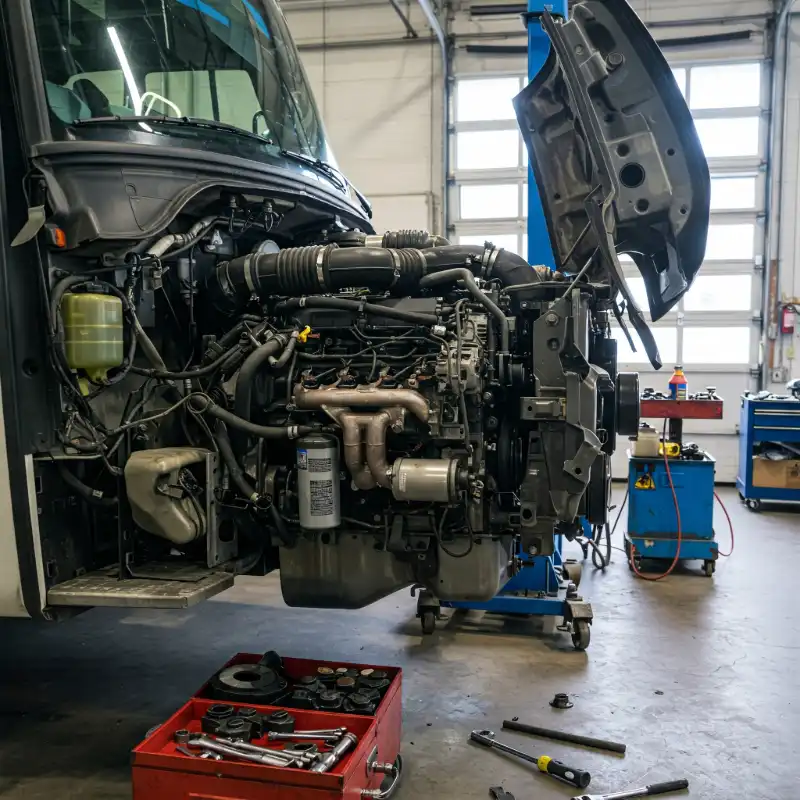The Importance of Effective Record-Keeping and Documentation: A Guide for Fleet Managers
Effective record-keeping maximizes fleet performance and reduces downtime. It aids in scheduling maintenance, ensuring compliance, and streamlining claims. Using digital tools and consistent practices helps keep operations smooth and cost-efficient.

At Fleetgo in Edmonton, Alberta, we’ve seen firsthand how crucial effective record-keeping is for managing a fleet. While it might not be the most glamorous part of fleet management, solid documentation practices can make all the difference in the efficiency, safety, and cost-effectiveness of your operations. For fleet managers, keeping detailed and organized records ensures that vehicles stay compliant, reduces downtime, and maximizes performance. In this guide, we’ll highlight the key reasons why record-keeping should be a priority and offer some practical tips to improve your processes.
Stay Ahead with Proactive Maintenance
Proactive maintenance scheduling is one of the most obvious benefits of proper record-keeping. When you have clear records of every vehicle’s service history, you can plan preventative maintenance well in advance, avoiding breakdowns that could take a vehicle off the road. A missed oil change or a forgotten brake inspection can snowball into bigger, more expensive problems. Keeping accurate logs allows you to track when each truck is due for tire rotations, fluid changes, and part replacements.
The key is to develop a habit of updating maintenance logs immediately after each service. Relying on memory or postponing data entry can lead to overlooked services. At Fleetgo, we use digital fleet management systems that automatically track and remind us of upcoming maintenance tasks, ensuring no service is missed.
Ensure Compliance with Regulations
Compliance with regulations, especially when it comes to safety, is non-negotiable in the fleet management industry. Whether it’s regular BIT inspections (which must be completed every 90 days) or ensuring vehicles meet emissions standards, having comprehensive records is essential to proving compliance during audits. In Edmonton, Alberta, as well as across Canada, stringent safety regulations must be followed, and penalties for non-compliance can be severe.
By keeping detailed records of each inspection, you’ll have the documentation necessary to quickly resolve any compliance issues that arise. Maintaining up-to-date logs of inspections, repairs, and certifications ensures that when regulatory agencies come knocking, you’re fully prepared.
Streamline Warranty and Insurance Claims
Having your records in order can save a lot of headaches when it comes to warranty claims or insurance disputes. Many warranties are voided if regular maintenance hasn’t been documented, and insurance claims can be denied without proof of timely repairs or servicing. This is where clear, accessible records become your best asset.
When a claim arises, you need to have all the supporting documents on hand—whether it’s a part replacement, routine service, or an inspection report. Organized service history logs that include dates, work done, and who performed the service will streamline the claims process and save your operation both time and money.
Enhance Fleet Performance with Data Analysis
Fleet managers who keep good records can gain valuable insights into the performance of their vehicles. By tracking everything from fuel efficiency to part failure rates, you can make data-driven decisions that improve fleet performance and reduce costs. For instance, if you notice that certain trucks require more frequent repairs or experience lower fuel efficiency, you can investigate further and make necessary adjustments—whether that’s driver training or implementing more rigorous maintenance protocols.
Effective documentation allows you to monitor trends over time. This long-term data can help you identify areas where your fleet could be more efficient and where improvements can be made, offering a significant competitive advantage.
Reduce Downtime and Increase Productivity
Fleet downtime is costly. Every minute a truck is off the road due to unexpected repairs means lost revenue and reduced productivity. With proper record-keeping, fleet managers can significantly reduce unplanned downtime. By having a comprehensive maintenance log, you can predict when a vehicle will need servicing and schedule repairs during less critical periods.
Additionally, when you maintain accurate documentation, you can keep track of worn parts and replace them before they fail, avoiding surprise breakdowns. This not only keeps your vehicles on the road longer but also minimizes the stress and frustration of dealing with emergency repairs.
Best Practices for Fleet Documentation
Implementing good documentation practices doesn’t have to be complicated, but it does require consistency. Here are some tips to improve your fleet’s record-keeping system:
- Use Digital Tools: Invest in fleet management software to keep all your records in one easily accessible location. Digital platforms can automatically track maintenance schedules, part replacements, and vehicle performance data.
- Standardize Record Entries: Ensure that everyone on your team follows the same format when logging service records. This will make it easier to pull up data when needed.
- Update Immediately: Record services and inspections as soon as they’re completed. Delaying updates can lead to forgotten or inaccurate entries, which could cause problems down the road.
- Centralize Records: Keep all your records in a centralized location—whether digital or physical. This prevents the loss of important documents and makes it easy to reference historical data.
- Train Your Team: Make sure everyone involved in managing fleet operations understands the importance of record-keeping and how to use your documentation system effectively.
Final Thoughts
Effective record-keeping is one of the most powerful tools a fleet manager has to ensure smooth operations, maintain compliance, and optimize fleet performance. By investing in good documentation practices, you not only prevent unnecessary breakdowns and repairs but also set your fleet up for long-term success. Take the time to audit your current documentation methods and see where improvements can be made—you’ll thank yourself later.
More Articles

5 Common Issues Found During CVIP Inspections in Edmonton

Spring Driving Prep: What Your Car Needs After Winter

The Biggest Fleet Repair Mistakes Business Owners Make
Contact FleetGo
Get in touch with Fleetgo today to request a quote or to schedule in-shop or mobile services in Edmonton & the surrounding area! Our mobile service extends to a 100km radius around Edmonton for emergency roadside assistance & mobile truck & fleet repairs, including Sherwood Park, Spruce Grove, Fort Saskatchewan, St. Albert, Stony Plain, along Highway 16, & more!



